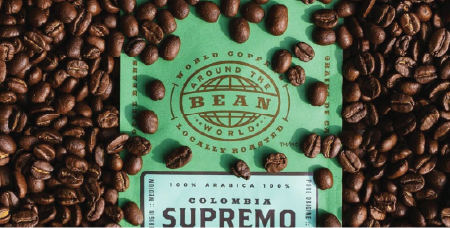El Paraíso – it means “the paradise” in English, and as much as coffee with earthy, chocolatey undertones truly is a heavenly thing, this brew’s story goes deeper than its tasting notes.
The coffee scene is one where ethics need to be continually pushed to the forefront of conversations on what it means to do “good business”. There can be a staggering number of people between a bean picked and a coffee consumed – growers, traders, processors, roasters, retailers, and consumers – and when coffee drinkers and cafés don’t do due diligence researching the ethics behind their morning cup, it’s easy to unknowingly throw money behind a product that gives one of those groups in the supply chain the short end of the stick.
Drying beds at the CCDA Coffee Processing Mill
For all of our roasts, we source beans directly from producers we know and trust, which simplifies the process and greatly cuts down on the risk that someone’s not being paid what he or she should be for hard work. However, just avoiding exploitation, while important, doesn’t feel adequate for a coffee with an idyllic name like “the Paradise”. If we were to stop someone on the street and ask her what comes to mind when she hears the word “paradise”, we’d hope to hear about a vision bigger than just not getting ripped off. To use a term coined by Café Justicia, we wanted to move beyond fair trade and into “solidarity trade”.
So, what is solidarity trade? Let’s go back to Café Justicia, since our relationship with them deserves more than a casual name drop. Café Justicia is a Canadian coffee network that works alongside co-ops in Mayan communities on the hillsides above Lake Atitlan in Guatemala. (There are plenty of places around the world that could use practical support from coffee businesses, but over the years, we’ve honed in on Guatemala.) These co-ops are organized by an advocacy group called the Camesino Committee of the Highlands (CCDA), which works to defend the rights of farm workers, recover lands stolen from Mayan communities in the past, and strengthen Mayan culture and spirituality.


Left: Coffee Plant Nursery | Right: Cupping at CCDA
Café Justicia beans are imported by a Vancouver-based volunteer organization called BC CASA, and then these beans are purchased by businesses like us, with proceeds going back directly to farmers and the CCDA to support social justice initiatives in the region. The Bean was the first coffee brand to partner with Café Justicia – back in 2001, before “fair trade” as a social movement had taken off in the Lower Mainland, and certainly before businesses started using the fairtrade label as a marketing strategy. There can be a lot of pretenses loaded into West Coast coffee culture, but even when you incorporate all the appeals of taste, smell, aesthetics, and café environment, coffee isn’t done “right” unless it’s repairing some wrongs. That philosophy has been underpinning our business from the beginning. We benefit from it, coffee drinkers benefit from it, and we want families who grow the beans to benefit from it, too. That is solidarity trade.
And when it comes to the social justice projects that Café Justicia supports, we’re pretty happy to offer our solidarity. The CCDA is both an organizer and a beneficiary of the Café Justicia initiative. Originally centred in the Madre Vieja valley of Solola, the movement has grown to include over 800 farmer communities in 19 provinces. In addition to organizing coffee farmers, the group mobilizes workers on sugar and cotton plantations, who are similarly vulnerable to the impacts of colonization. The CCDA uses the coffee income to fund Mayan-run community development projects focused on food sovereignty, and provide scholarships for its members’ children. The organization has a strong environmental ethic and trains its members to grow both their coffee and food organically – in ways that protect water and enhance natural forest cover.

Lake Atitlan, Guatemala
Another group supported by Café Justicia is H.I.J.O.S., a movement of youth whose parents disappeared during Guatemala’s 36-year long civil war. H.I.J.O.S. attempts to find out what happened to the missing mothers and fathers, and to bring “death squads” and other military personnel who are responsible to justice. Cafe Justicia uses profits from coffee sales in Canada to support H.I.J.O.S.’ work. Finally, Café Justicia sales support Artesana, a women’s organization that assists imprisoned women in Guatemala and provides training and protection for their children.
By partnering with Café Justicia – and initiatives like the CCDA, H.I.J.O.S. and Artesana – we’re confident that the coffee we sell is doing more than the minimum when it comes to ethics. We’re sure that when you hear the word “paradise”, all sorts of things come to mind (for us, a cup or two of low acidity, medium body coffee is included). We hope that when you hear it said in Spanish – El Paraíso – you’ll think about the concept of justice.




